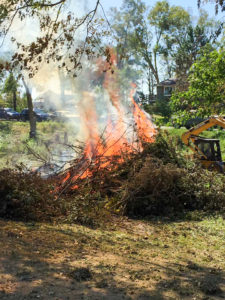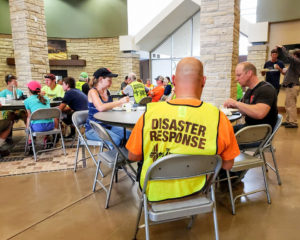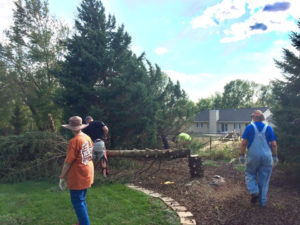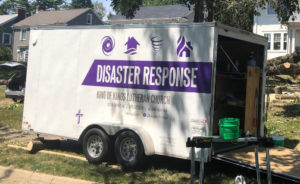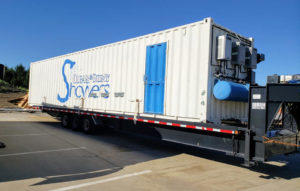This is a summary of the destructive storm that swept through eastern Iowa and hit Cedar Rapids, a community of nearly 220,000 people. Pastor Mark Halvorson, of King of Kings Lutheran Church, provides the summary along with suggestions of how you can help.
Early in the afternoon of August 10, 2020, a line of thick, dark clouds formed in the west. What we thought was simply another large midwestern summer storm turned into something much, much worse—a derecho, as a land-based hurricane is called. No one I know had ever heard of such a thing; we all have now. This Iowa hurricane was the equivalent of a class 3 hurricane with sustained winds of 110 mph and gusts of up to 140. These winds unexpectedly came at us nearly an hour in duration over an area about 45 miles wide and over most of eastern Iowa into Illinois. Sadly, three lives were lost in Iowa and one in Illinois. The storm destroyed all of our new construction at our church but did much worse in the older parts of our area with the biggest, oldest trees. Sixty-seven percent of the tree cover in the greater Cedar Rapids area is destroyed along with many roof tops, garages, and cars that they landed on. In Cedar Rapids alone, that is 23,000 trees and 1,800 telephone poles; 3,200 in the area. We were without power for just over a week, some areas over two weeks. So far, 64,500 tons of debris taking 27,000 truckloads have been removed. This constitutes only 22% of the wreckage.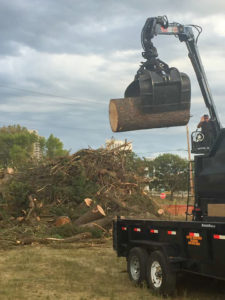
Farmers lost 46% of their crops and now a drought has been declared in Iowa. Our church’s few full-time farm families lost all of their crops, most of their buildings and, in one case, their house. The crops that did survive are drying up and are littered with building debris which are tangled in the crops, making it virtually impossible to operate combines for the fall harvest. One member, a lifetime Iowan, put it this way: “One tornado is bad enough, but this was like a hundred hitting us at the same time.”
After three weeks, things have moved from disaster response to recovery. Many of the disaster teams and machinery have moved to the Gulf Coast in response to Hurricane Laura. Although most people have power and access to homes and services and businesses that are now opened, our needs as a community are still great. Downed and damaged trees still need to be cut up and removed. There are thousands of trees that the state arborist says will die because of damage or drought. Repairs have begun and the economic impact is still being calculated. Initial estimates are in the four-billion-dollar range.
What kind of help is needed? First, volunteers to come and form clean-up crews. We at King of Kings have virtually taken charge on behalf of the District in the Cedar Rapids area. We have our own experienced Disaster Response Team with our own trailer purchased by our wonderful LWML (national level). One of our members agreed to coordinate with congregations and individuals who want to come to Cedar Rapids. Our DCE is also part of the leadership team and is responsible for scheduling youth and young adult groups who want to come and serve. We are set up to host groups at our church and have already done so. We also feed the teams breakfast and lunch. We have 10 RV hookups as well as a shower trailer.
Second, we are in need of supplies. Please click here for a full list of needs. I suggest gas gift cards (Casey’s, Hy-Vee, BP), grocery store gift cards (Hy-Vee, Fareway and Walmart in particular), as well as Home Depot, Lowes, and Menards gift cards. Individuals can also follow this link to an Amazon wish list of items to purchase and send to our King of Kings Disaster Relief Team directly. 100% of what is purchased goes to the relief efforts. For monetary donations, click here.
Estimates are that it will take up to a year to clean this mess. Our congregation plans to plant 5,000 trees in the spring, something else people can support financially.
In the flood of 2008, one of the worst ten natural disasters to hit our nation, 33 square miles were underwater. The destruction caused by the derecho is many times that and, while Iowans are resilient and work hard, we need help—now. I am asking on their behalf.
To join a current Lutheran Early Response Team (LERT) or to learn more, visit the Michigan District Disaster Response webpage or contact Travis Grulke, the Michigan District LERT coordinator.
Photos courtesy of King of Kings Lutheran Church, Cedar Rapids, IA
